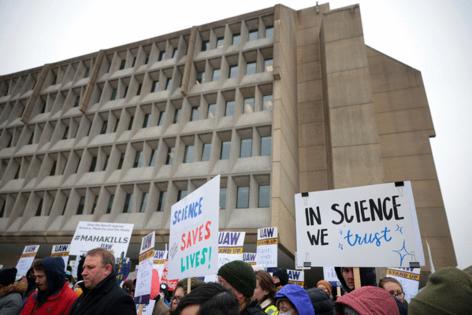Greater share of US losing faith in health guidance, poll says
Published in News & Features
WASHINGTON — About 44% of U.S. adults say they expect to lose trust in government health recommendations over the next four years because of federal leadership changes, according to a poll published Tuesday from Harvard University and the de Beaumont Foundation.
Researchers asked 3,343 adults online and on the phone about their reaction to having “new leaders in charge of federal public health agencies,” though the changes weren’t described and officials placed into high positions weren’t named.
The poll found that 28% of Americans say they’ll gain trust in public health recommendations because of the new leadership.
Three months in, the Trump administration has been marked by major clawbacks at health care agencies, the most widespread measles outbreak in six years, and concerns over Health and Human Services Secretary Robert F. Kennedy Jr.’s pledges to change how the country addresses chronic disease.
The results also arrive as Harvard is suing the Trump administration over the freezing of $2.2 billion in response to how the institution has handled pro-Palestine protesters and diversity programming.
According to the poll, attitudes were generally divided along party lines, with about 76% of Democrats saying they’ll lose trust and 57% of Republicans saying they’ll gain it.
Among the respondents who believe that the CDC will function worse, primary concerns were that politics will influence decision-making, the administration will scale back too much, or that public health threats like infectious diseases will be downplayed. Respondents also worried about the agency being influenced by big corporations, recommendations will be based on unproven science, and the dismissal of health equity issues.
Among people who said they believe the CDC will function better over the next four years, about a third said they believed that leadership will make decisions to reduce financial waste, make recommendations that have been ignored by previous leaders, and focus more on the primary health problems facing Americans, like chronic disease.
The poll also revealed many areas of bipartisan agreement.
Democrats and Republicans alike reported that they’d like the CDC to prioritize preventing chronic disease, protecting against new viruses with pandemic potential, and reducing maternal and infant mortality. Other bipartisan priorities included ensuring the safety of tap water, addressing mental illness and addiction, promoting better nutrition and protecting people from common risks like foodborne illness or heatstroke.
The poll’s authors said that the findings should be used by leaders to find ways to bolster trust.
“New fault lines are emerging in trust for public health agencies,” Gillian SteelFisher, the survey lead at Harvard, said in a statement. “More people are very concerned than very hopeful about what agencies will be able to do in the next few years and more anticipate losing a lot of trust rather than gaining it.”
“Americans are more united than divided about the health issues they want the administration to prioritize,” Brian C. Castrucci, president and CEO of the de Beaumont Foundation, said in a statement. “These findings are a call to action to fund what works, fix what doesn’t, and find ways to work together to address these shared concerns.”
The poll, conducted March 10-31, was also supported by the Robert Wood Johnson Foundation.
©2025 CQ-Roll Call, Inc., All Rights Reserved. Visit cqrollcall.com. Distributed by Tribune Content Agency, LLC.







Comments